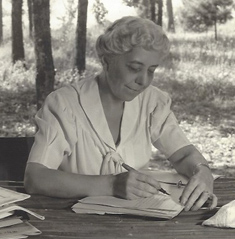Or is it? Are women loved? Hated? Revered? Feared? Pampered? Oppressed? All of the above? It depends on where you look in the Manuscripts & Folklife Archives collections of WKU’s Department of Library Special Collections. For this International Women’s Day, here are a few examples:
It is my sad lot to write you that it is a girl instead of a boy. — Bill Gossedge of Louisville, announcing the birth of his daughter in 1939.
I was liberated on the day I was born–in 1920! Women have always been able to do what they wanted to if they wanted it enough–and have a family as well. — Martha Mauldin of Bowling Green, responding to a 1996 “Rush Limbaugh Position Poll” to show “that feminists are out of step with most Americans.”
Woman is the embodiment of soul, romance, beauty and delicacy, that gives refinement to society, delight and enjoyment to the senses, and happiness to the mind. — Byron R. Gardner, decrying supporters of woman suffrage “as if it were a greater boon to act with wicked men than to influence them.”
This will could never be recorded, as your wife was a married woman. — Bowling Green lawyer Daniel Webster Wright, returning to Simon P. Morgan his deceased wife Cassandra’s 1871 will. She had left everything to her husband, but marriage deprived her of her legal identity and property rights, so the will was meaningless.
And, of course, on this “Day Without a Woman,” it’s worth remembering that some of the fondest words spoken about women come after they’re dead. Here’s Rev. Benjamin S. McReynolds of Butler County, writing on the death of his wife Elizabeth in 1816: My dear Elizabeth is gone / To inherit an immortal crown. / Reserved for her in heaven above, / Where she’s inflamed with joy and love. Or this from poet Cale Young Rice, in a letter to his brother eleven months after the death of his wife: My life seems to have run into a blind alley at present. The loss of Alice and my home, the feeling that I have finished my work . . . leaves me desireless. “Alice” was Alice Hegan Rice, author of the classic story of life in a Louisville slum, Mrs. Wiggs of the Cabbage Patch. Two weeks later, Cale took his own life, unable to cope “without a woman.”
Click on the links to access finding aids for these collections. For more, search TopSCHOLAR and KenCat.

